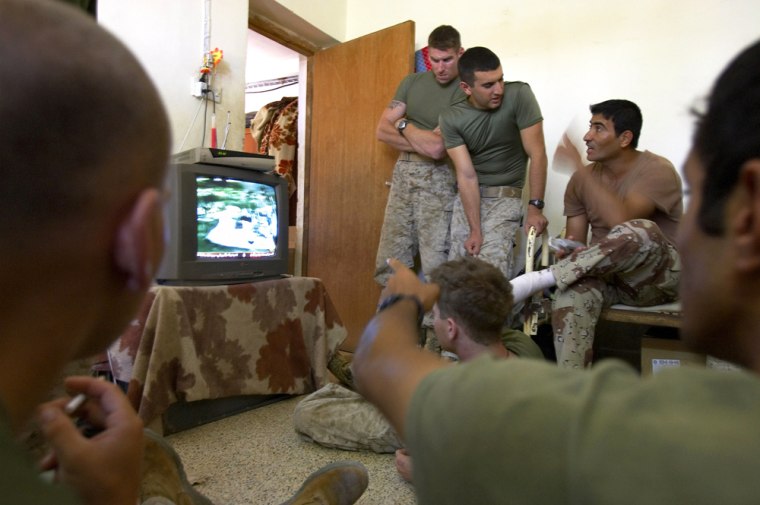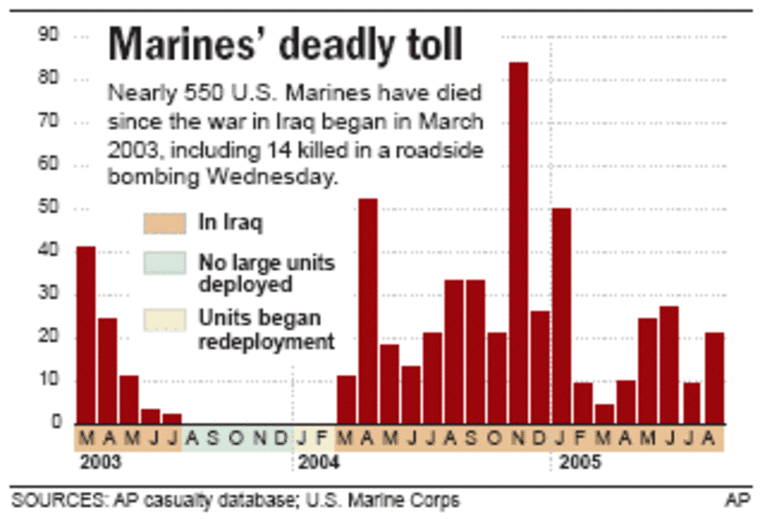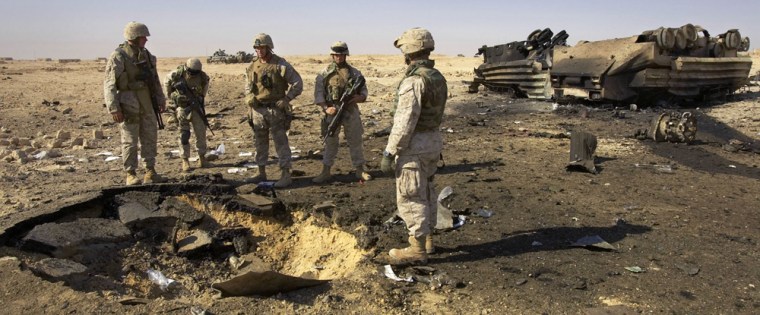The deaths of 22 Marines this week in Iraq, including one more on Thursday, has brought to the surface this tragic fact: that branch of the U.S. military has taken casualties disproportionate to its numbers in Iraq.
The Marines have one of the roughest assignments in Iraq: pacifying the perpetually restive Anbar province, home to Fallujah, Ramadi and Haditha, all sites of heavy American casualties since the insurgency went into high gear last year.
Marines number more than 23,000 out of 138,000 members of the U.S. armed forces in Iraq, or 17 percent. Yet they have lost at least 530 of the more than 1,820 U.S. personnel who have died there, or 29 percent, Marine officials said.
On Thursday, a Marine was killed in Ramadi by small arms fire, the military said. A day earlier, 14 Marines were killed when a roadside bomb detonated under their amphibious assault vehicle in Haditha in western Iraq. Two days before that, seven other Marines died, six in Haditha and one nearby.
The largest single toll for the Marines was last January when a helicopter claimed the lives of 30 Marines and a Navy sailor. The aircraft went down in bad weather, but the military has yet to issue a finding on the cause of the crash.
Right role?
The Marines stepped up operations in May in hopes of pacifying the Anbar region so Iraqi military and civilian forces could assume effective control. However, government authority in the heavily Sunni Arab region is tenuous.
Some military experts pointed to Wednesday’s attack — the deadliest roadside bombing suffered by American forces in the war — to note the Marines are performing duties somewhat different from those for which they are organized and equipped. The amphibious vehicle, for example, was designed to get troops ashore and is less armored than some other infantry carriers.

“It’s basically designed to get across the beach and get a few dozen miles inland,” said John Pike, a military expert with Globalsecurity.org. “The point being, once (Marines) had managed to secure the beachhead and get a few miles inland, the Army would come ashore and take over from there.”
Beyond that, occupation and stabilization duties often require expertise and equipment distinct from amphibious assault and the rapid capture of enemy-held territory, experts said.
“The entire Marine force was designed around the concept of amphibious warfare, which is a good deal different from the kind of conflict they’re fighting in Iraq today, hundreds of miles from the sea,” said Loren Thompson of the Lexington Institute think tank. “The Marines are a light force; they kick in the door but they are not supposed to occupy all the rooms.”
From food aid to Fallujah
Still, the service has tried to adapt to changing missions, studying concepts like urban warfare and nonlethal weaponry. Marines took the lead in supplying food during a famine in Somalia in the early 1990s.

They, along with the Army’s 3rd Infantry Division, comprised the leading forces in the drive toward Baghdad in 2003.
Since the invasion of Iraq, the Army’s effort to keep its troops fresh by rotating them in and out of the country has created a need to use the Marines as a stabilization and counterinsurgency force in parts of the country, experts said.
In November, Marines led the assault to retake Fallujah, an insurgent stronghold 40 miles west of Baghdad. They had regular clashes with insurgents there and in nearby Ramadi for months before.
The Marines killed Wednesday were part of a sweep for insurgents in communities along the Euphrates River between Baghdad and the Syrian border.
‘Lethal ... adaptive enemy’
U.S. officials have long complained that American forces seize Sunni areas only to have Iraqi authorities lose them again to the insurgents once American troops leave. Despite those complaints, the Bush administration is talking about handing more security responsibility to the Iraqis and drawing down forces next year.
At the Pentagon, Brig. Gen. Carter Ham said similar operations were under way in several communities at once, to prevent insurgents from skipping to towns without a strong U.S. presence.
He suggested the attacks on the Marines were the insurgents’ response to their stepped-up operations.
“This is a very lethal and unfortunately very adaptable enemy we are faced with,” said Ham, a Pentagon staff officer and former commander of U.S. forces in Mosul, Iraq.
